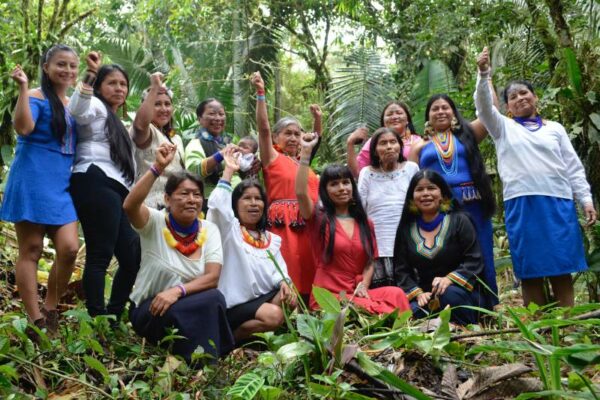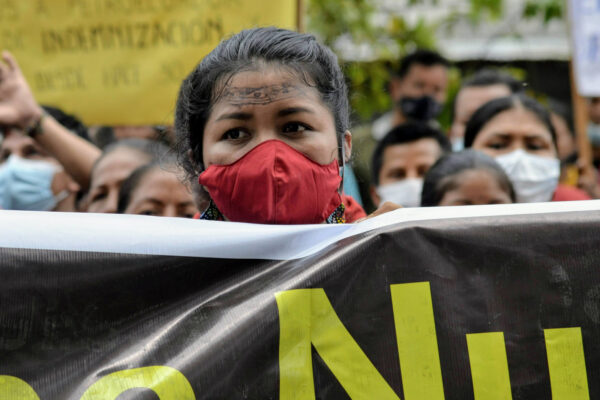Quito, Ecuador – Ecuador’s oil minister Wilson Pastor Wednesday presented terms for an international licensing round for new blocks in the country’s southeast amid protests by indigenous groups seeking to protect the area of the Amazon basin, which is still 85% covered by rainforest.
Industry executives said that the protests put the government’s plans at risk because of the threat of legal challenges if companies participate.
“In an optimistic scenario, we’d like to replace approximately the remaining reserves we have today,” Pastor told an audience of oil industry executives. That would be close to the higher range of around 1.6 billion barrels the ministry estimates could lie under the 400,000-hectare area (nearly 1 million acres) encompassing close to the whole of the provinces of Pastaza and Morona-Santiago.
The low range is about 300 million barrels, less than two years of output at the current production rate of around 500,000 b/d.
Pastor put remaining reserves at 1.9 billion barrels, a horizon of just over 10 years of production for OPEC’s smallest member.
The oil is likely to be at lower depths than in recent discoveries in Brazil and easier to extract than in non-conventional deposits, making it technologically easier and cheaper to extract. No point of the area is more than 120 km (75 miles) from existing pipelines, hence investments in new pipelines won’t run above a maximum $250 million, Pastor said.
Bids are expected by the end of next May, with preliminary qualification of bids by the end of July and a signing of four-year exploratory contracts planned for the end of next year.
Production contracts would run 20 years, followed by environmental remediation periods.
Exploration of the entire area, divided into 21 new blocks, would outstrip the financial abilities of state-run Petroecuador, for which three blocks will be reserved that it will explore together with one or more state-owned partners. This includes Petroperu and, potentially, Colombia’s Ecopetrol in a block directly on the border with Peru, Pastor said.
“Predictable risk investment would run from $1 billion to $4 billion if all 21 blocks were to be explored,” while 13 will be offered initially, with 10 in an open tender and three offered directly to state-run oil companies, Pastor said.
The likelihood of finding commercially viable reserves is lower than in Ecuador’s northeast Amazon, were major production started 40 years ago, Pastor added.
One in three exploratory wells are likely to find oil in the southeast, compared with two out of three further north, he explained.
While production contracts will run under the per-barrel payments scheme President Correa forced companies to accept in 2010, the model will be flexible for new production going online, guaranteeing returns on capital between 15% and 25% for oil extracted from cretaceous depths and up to 30% for those of pre-cretaceous depths, Pastor said.
Tariffs will also be scaled for production levels from 10,000-30,000 b/d, 30,000-100,000 b/d, and above 100,000 b/d.
“The tariff system covers the uncertainty of reserve discoveries and once a field is discovered covers the certainty that production will decline in time,” he said.
Pastor added that he expects the current high-price environment for oil to continue at least through 2020, even though periodic dips in prices are feasible.
“The trend is that we will be in a world between $100 and $150 a barrel as indicated by all international institutions, be they OPEC, be they the International Energy Agency, or very large companies like BP and Exxon until the year 2020, considering supply and demand,” Pastor said.
Companies will also be obliged to provide funds for government investment in social projects in local communities in the affected areas, Pastor said, adding that these have been approached over the past 18 months to inform them of the exploration plans and secure their approval.
Indigenous leaders however said that the government consultation process was flawed because it failed to meet good faith standards established in a July 2012 ruling by the Inter-American Court of Human Rights (IACHR).
A group of several dozen leaders and environmentalists protested against the oil round at the entrance of the luxury hotel in which the business meeting took place.
“This consultation fails to provide guarantees for investment by private companies, especially oil companies,” said Franco Tulio Viteri, president of the CONFENIAE, the umbrella organization of Amazon indigenous groups.
Pastor responded that the CONFENIAE’s opposition to oil development had led it to reject consultations with the government. “If anyone has failed to be participate, it was you,” he added.
Oil executives and analysts on the sidelines of the meeting said that indigenous opposition weakens the likelihood of a successful round of tenders given the IACHR ruling.
“If you can’t beat them, join them. All possible means of dialogue need to be established, to end up as friends, not as enemies,” said Rene Ortiz, an oil consultant and former OPEC secretary general.
Ortiz also questioned the contract model for development of new fields: “They’re saying the complete upside will be for them, that’s useless [for investors].”
Other executives noted the fact that the North Peruvian pipeline transports less than a third of the crude it was designed for points to a limited outlook for new deposits on the Ecuadorean side. Pastor mentioned that the last similar round in 1997 failed to attract bids.













